人教新目标版英语八年级下Unit 9 Have you ever been to a museum?Section A 复习课件(30张ppt无素材)
文档属性
| 名称 | 人教新目标版英语八年级下Unit 9 Have you ever been to a museum?Section A 复习课件(30张ppt无素材) | 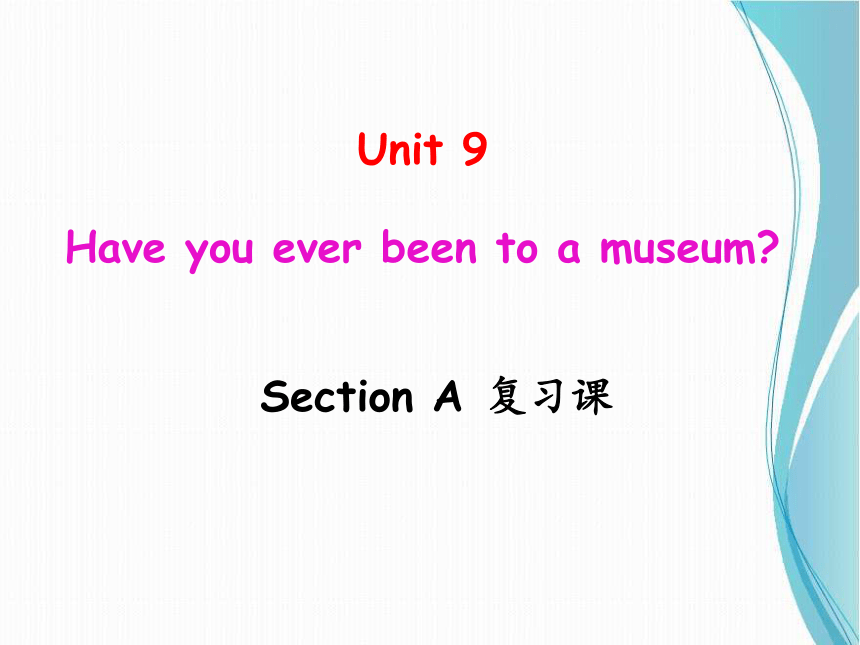 | |
| 格式 | zip | ||
| 文件大小 | 3.1MB | ||
| 资源类型 | 教案 | ||
| 版本资源 | 人教新目标(Go for it)版 | ||
| 科目 | 英语 | ||
| 更新时间 | 2020-07-01 00:02:14 | ||
图片预览

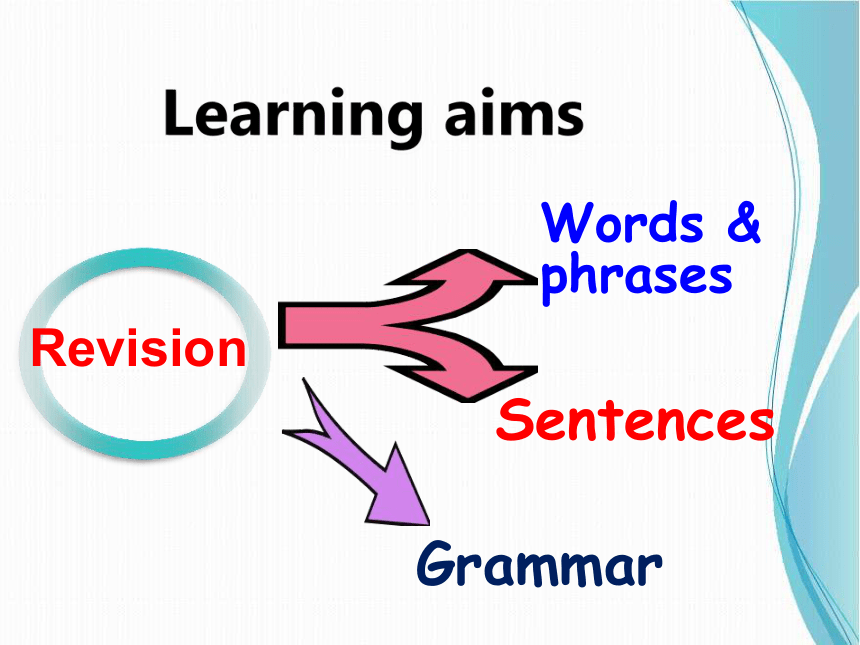
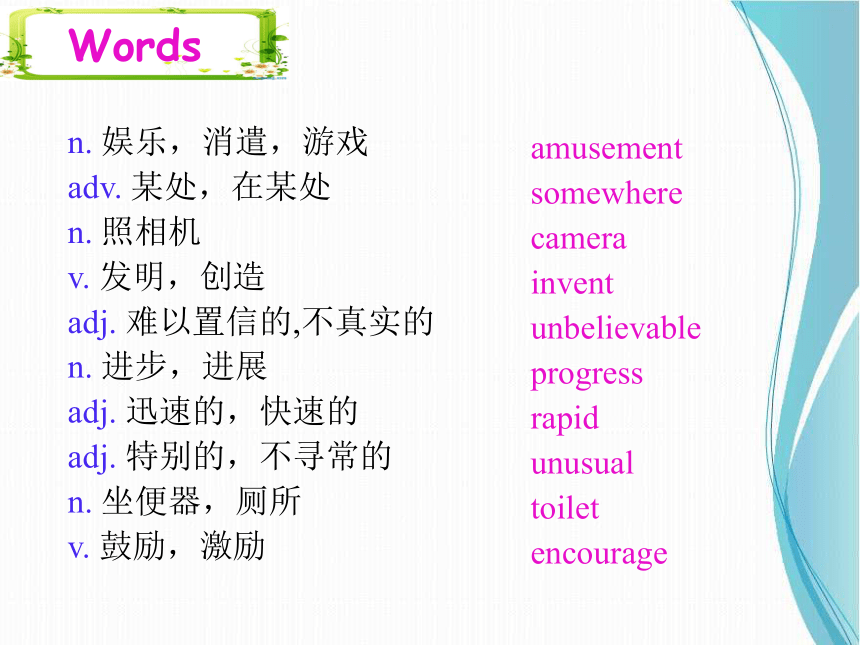
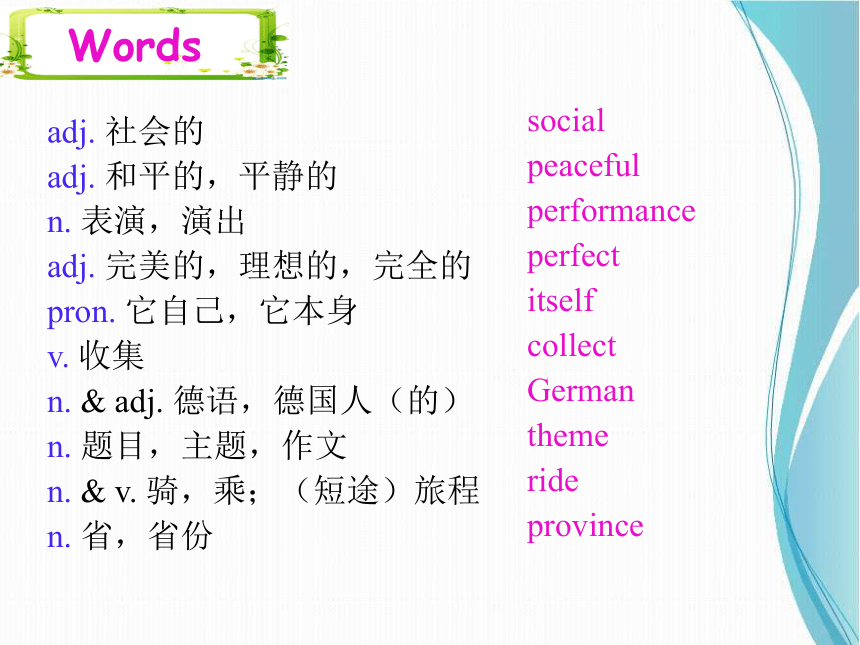
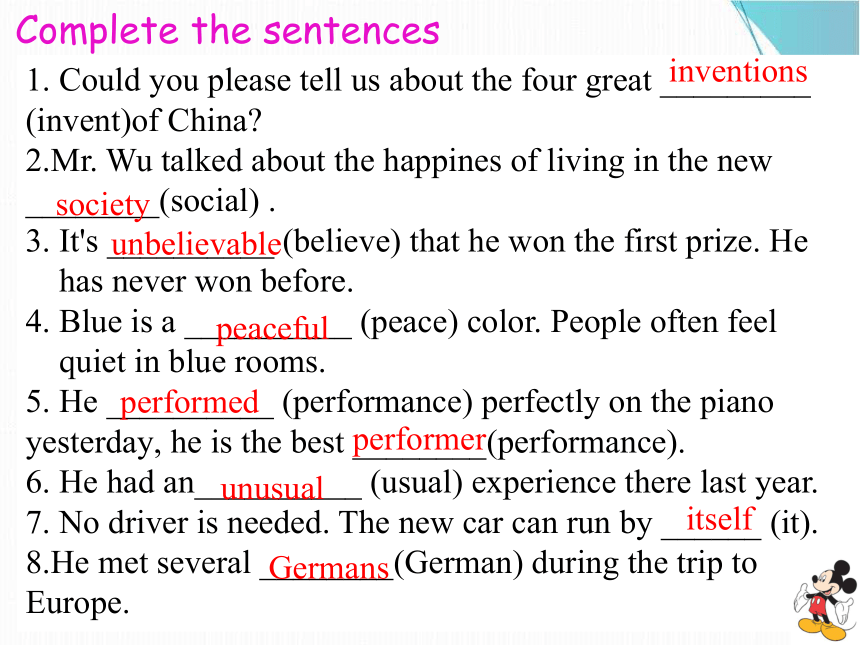
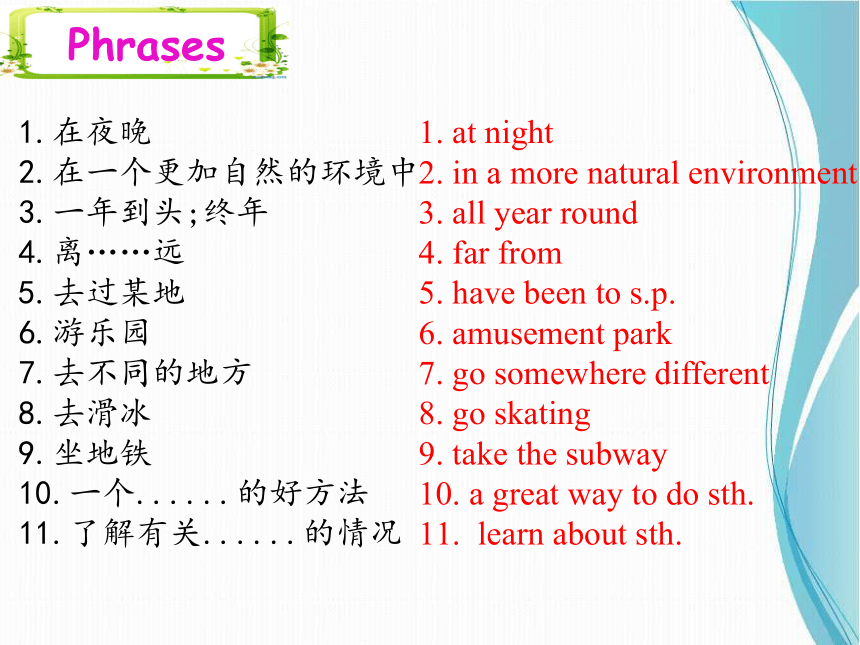
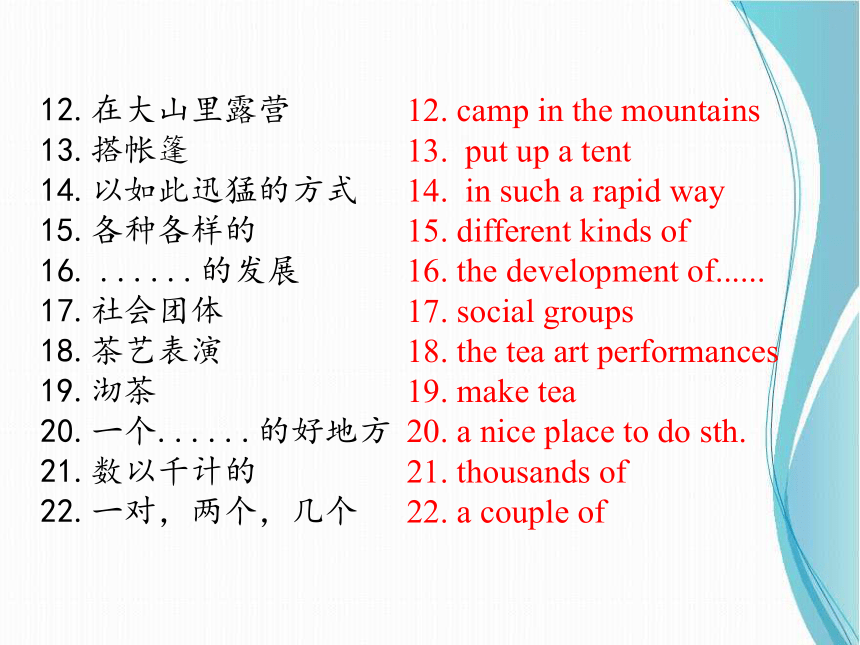
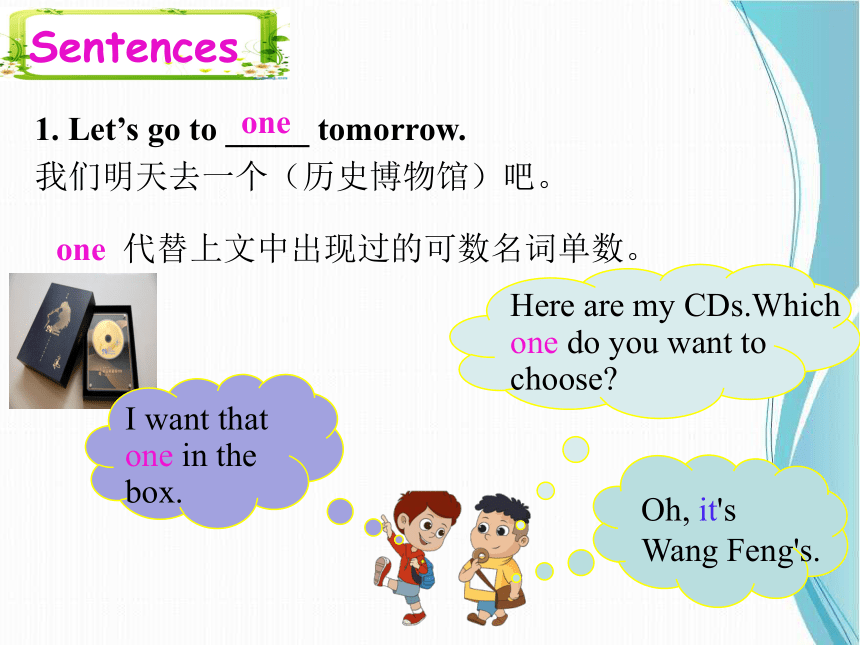
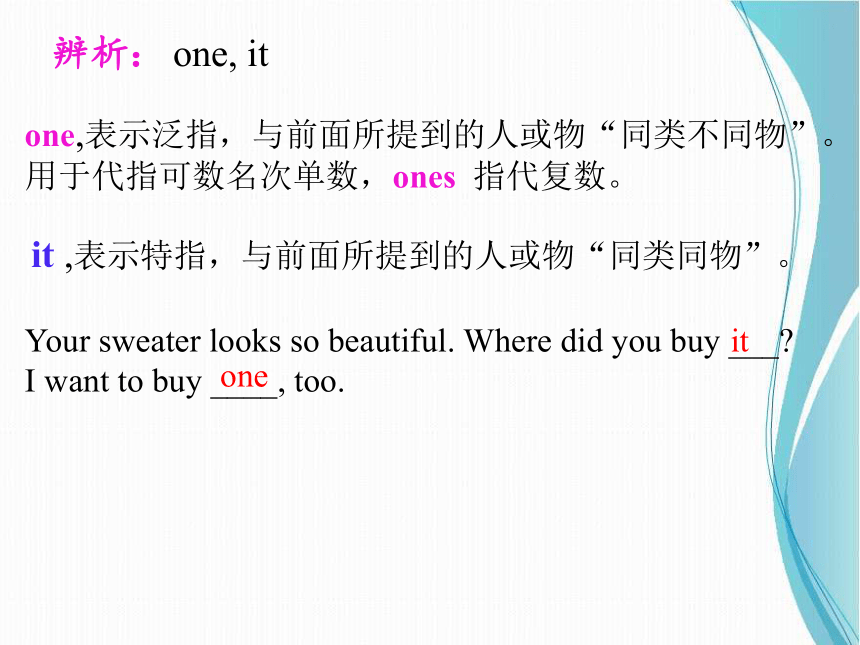
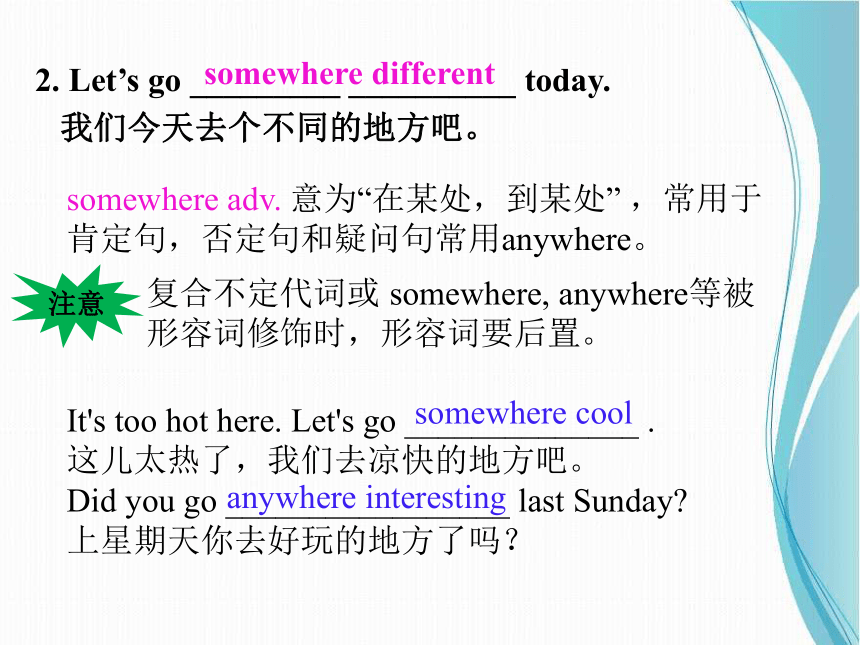
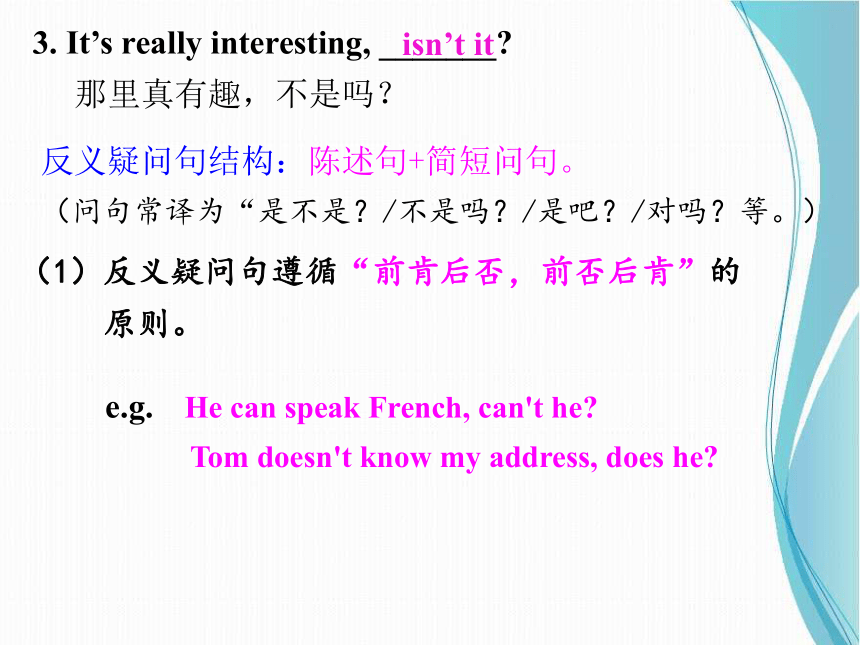
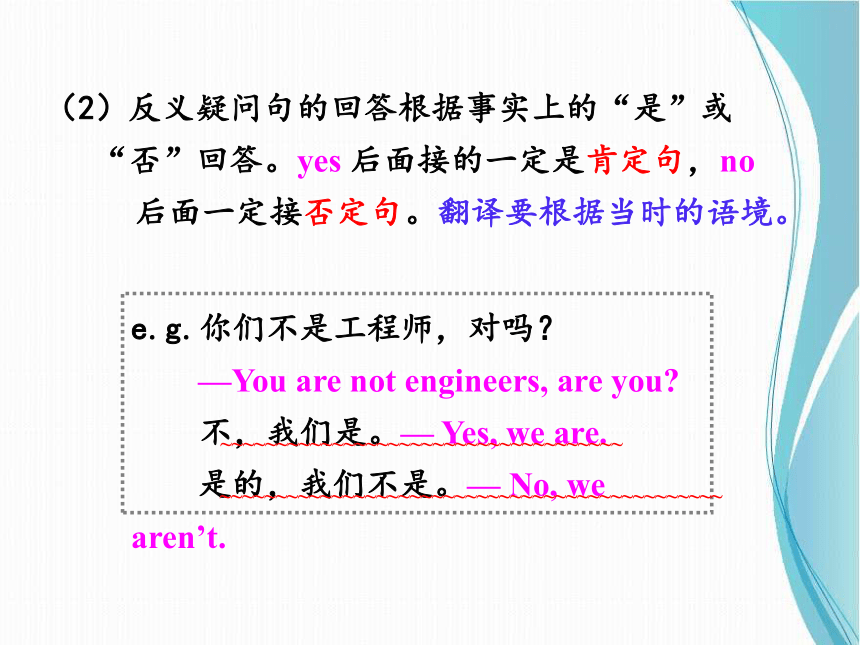
文档简介
(共30张PPT)
Section
A
复习课
Unit
9
Have
you
ever
been
to
a
museum?
Learning
aims
Revision
Words
&
phrases
Sentences
Grammar
n.
娱乐,消遣,游戏
adv.
某处,在某处
n.
照相机
v.
发明,创造
adj.
难以置信的,不真实的
n.
进步,进展
adj.
迅速的,快速的
adj.
特别的,不寻常的
n.
坐便器,厕所
v.
鼓励,激励
amusement
somewhere
camera
invent
unbelievable
progress
rapid
unusual
toilet
encourage
adj.
社会的
adj.
和平的,平静的
n.
表演,演出
adj.
完美的,理想的,完全的
pron.
它自己,它本身
v.
收集
n.
&
adj.
德语,德国人(的)
n.
题目,主题,作文
n.
&
v.
骑,乘;(短途)旅程
n.
省,省份
social
peaceful
performance
perfect
itself
collect
German
theme
ride
province
Complete
the
sentences
1.
Could
you
please
tell
us
about
the
four
great
_________
(invent)of
China?
2.Mr.
Wu
talked
about
the
happines
of
living
in
the
new
________(social)
.
3.
It's
__________
(believe)
that
he
won
the
first
prize.
He
has
never
won
before.
4.
Blue
is
a
__________
(peace)
color.
People
often
feel
quiet
in
blue
rooms.
5.
He
__________
(performance)
perfectly
on
the
piano
yesterday,
he
is
the
best
________(performance).
6.
He
had
an__________
(usual)
experience
there
last
year.
7.
No
driver
is
needed.
The
new
car
can
run
by
______
(it).
8.He
met
several
________(German)
during
the
trip
to
Europe.
inventions
society
unbelievable
peaceful
performed
unusual
itself
Germans
performer
1.在夜晚
2.在一个更加自然的环境中
3.一年到头;终年
4.离……远
5.去过某地
6.游乐园
7.去不同的地方
8.去滑冰
9.坐地铁
10.一个......的好方法
11.了解有关......的情况
1.?at
night
2.?in
a
more
natural
environment
3.?all
year
round
4.?far
from?
5.?have
been
to
s.p.??
6.
amusement
park??
7.?go
somewhere
different
8.?go
skating??
9.?take
the
subway??
10.?a
great
way
to
do
sth.????
11.??learn
about
sth.
??
12.在大山里露营
13.搭帐篷
14.以如此迅猛的方式
15.各种各样的
16.?......的发展
17.社会团体
18.茶艺表演
19.沏茶
20.一个......的好地方
21.数以千计的
22.一对,两个,几个
12.?camp
in
the
mountains
13.??put
up
a
tent
14.??in
such
a
rapid
way
15.?different
kinds
of
16.?the
development
of......
17.?social
groups
18.?the
tea
art
performances
19.?make
tea
20.?a
nice
place
to
do
sth.???
21.?thousands
of?
22.
a
couple
of
?
1.
Let’s
go
to
_____
tomorrow.
我们明天去一个(历史博物馆)吧。
one
one
代替上文中出现过的可数名词单数。
辨析:
one,
it
one,表示泛指,与前面所提到的人或物“同类不同物”。
用于代指可数名次单数,ones
指代复数。
it
,表示特指,与前面所提到的人或物“同类同物”。
Your
sweater
looks
so
beautiful.
Where
did
you
buy
___?
I
want
to
buy
____,
too.
one
it
2.
Let’s
go
_________
__________
today.
我们今天去个不同的地方吧。
somewhere
different
somewhere
adv.
意为“在某处,到某处”
,常用于肯定句,否定句和疑问句常用anywhere。
注意
复合不定代词或
somewhere,
anywhere等被形容词修饰时,形容词要后置。
It's
too
hot
here.
Let's
go
______________
.
这儿太热了,我们去凉快的地方吧。
Did
you
go
_________________
last
Sunday?
上星期天你去好玩的地方了吗?
somewhere
cool
anywhere
interesting
3.
It’s
really
interesting,
_______?
那里真有趣,不是吗?
反义疑问句结构:陈述句+简短问句。
(问句常译为“是不是?/不是吗?/是吧?/对吗?等。)
isn’t
it
(1)反义疑问句遵循“前肯后否,前否后肯”的
原则。
e.g.
He
can
speak
French,
can't
he?
Tom
doesn't
know
my
address,
does
he?
(2)反义疑问句的回答根据事实上的“是”或
“否”回答。yes
后面接的一定是肯定句,no
后面一定接否定句。翻译要根据当时的语境。
e.g.你们不是工程师,对吗?
—You
are
not
engineers,
are
you?
不,我们是。—
Yes,
we
are.
是的,我们不是。—
No,
we
aren’t.
~~~~~~~~~~~~~~~~~~~~~~~~~~~~~~~~~~~~
~~~~~~~~~~~~~~~~~~~~~~~~~~~~~~~~~~~~~~~~~~~~~
常考的特殊句型:
陈述部分有few,
little,
never,
no,
nobody,
nothing,
hardly,
seldom等否定含义的词时,附
加疑问句用肯定形式。
e.g.这个男孩几乎不会游泳,是吗?
The
boy
can
hardly
swim,
can
he?
陈述部分为I
am…时,附加疑问句用“aren’t
I?”;当陈述部分以I
wish
开头时,疑问部分
常用“may
I?”
我和你妹妹一样高,不是吗?
I
am
as
tall
as
your
sister,
aren’t
I?
主句含有I
think/
suppose/
believe/
guess/
expect,
变反义疑问句时,注意否定转移。
I
don’t
think
he
will
come,
_______?
e.g.我认为他不回来,对吗?
will
he
4.
They
have
information
about
different
computers
and
who
_________
them.
那里有关于不同计算机和其发明者的信息。
invented
invent
v.
发明,创造
invention
n.
发明,
发明物
inventor
n.
发明家,发明者
Adison
was
a
great
_______
who
________many
useful
_________.
inventor
invented
inventions
5.
It's
____________
that
technology
has
_________
in
______
a
rapid
way!
科技进步的速度如此之快,真是让人难以置信!
unbelievable
such
progressed
uncomfortable
It’s
unbelievable
that
…
令人难以置信的是…
it
是形式主语,真正的主语是that引导的从句
It’s
unbelievable
that
she
has
finished
the
work
in
a
short
time.
真是令人难以置信,她用很短的时间完成了那项工作。
progress
此处用作动词,意为“进步,进展”
progress
还可用作不可数名词,意为“进步,进展”,
make
progress
(in...),
意为“(在......方面)取得进步”
____
the
teacher's
help,she
has
____
great
progress
__
math.
在老师的帮助下,她在数学方面取得了很大进步。
With
made
in
6.
It
also
_________
governments
and
social
groups
__
_____
_______ways
to
improve
toilets
in
the
future.
它也鼓励政府和社会团体思考来改善厕所的方法。
encourage
...
to
...
鼓励……做……
我妈妈总是鼓励我尽最大努力。
My
mother
always
encourages
me
to
try
my
best.
encouragement
n.
鼓励;激励
improve作及物动词时,意为“改进;改善;提高”;
作不及物动词时,意为“有改进;好一些”。
improvement
n.
改进,改善
To
improve
my
English,
Miss
Miller
helped
me
a
lot.
encourages
to
think
about
7.
_________
the
tea
preparation
is
just
as
_________
as
drinking
the
tea
itself.
看沏茶的过程和饮茶本身一样令人愉快。
-able
是一个典型的形容词后缀,
可加在动词之后,
表示“可…..的;
能够……的”。
drinkable
(可饮用的),
washable
(可洗的),
readable
(可读的),
usable
(可用的;
可使用的)等。
enjoyable
Watching
watching
the
tea
preparation
动名词短语作主语,后面动词用单数
e.g.
Seeing
___
believing.
is
8.
There
are
many
exciting
_____,
lovely
restaurants
and
________
gift
shops
there.
那里有许多令人兴奋的可乘坐的游乐设施,可爱的餐
馆和极好的礼品店。
ride
可数名词“供乘骑的游乐设施”;还可意为
“短途旅行”
ride
v.
骑
ride-
rode-ridden
rides
fantastic
There
are
many
_____(ride)
in
the
amusement
park.
He
learned
________
(ride)a
bike
yesterday.
rides
to
ride
Anna
and
Jill
___________
a
film
museum.
It’s
really
interesting.
It’s
a
great
way
________
a
Saturday
afternoon.
Jill
loved
all
the
old
movie
cameras
there.
She
_________
______
the
inventions
that
________
color
movies,
too.
Jill
__________
camping
in
the
mountains
with
some
friends.
They
________
a
tent
and
cooked
outside.
Fill
in
the
blanks
according
to
the
conversation.
have
been
to
to
spend
learned
about
led
to
has
been
put
up
2d
课本回归
Ken:
The
most
interesting
museum
I
___
(be)
to
is
the
American
Computer
Museum.
They
have
information
____
different
computers
and
____
them.
The
old
computers
were___
.It’s_____
that
technology
_____
in
_____
way!
I’ve
also
_____
that
there
was
a
_____
computer
.It
____
play
chess
even
____
than
humans.
I
wonder
____
computers
will
____
do
____.
Retelling
Amy:
I_____
to
a
very
_____
museum
in
India,
the
International
Toilets.
I
just
_____
when
I___
____
different
_____
of
toilets
there.
The
museum
teaches
people
_____
the
history
and
(develop)_____
of
toilets.
It
also
_____
governments
and
social
groups
to
_____
toilets
in
the
future.
Linlin
:
Last
year
I
went
to
the
Hangzhou
National
Tea
Museum.
It’s
a
_____
place
near
a
lake.
The
tea
art
performance
show
____
a
__
cup
of
tea
__
beautiful
tea
___.
_____
the
tea
_____
is
just
____drinking
the
tea
_____
.
I_____
why
my
grandpa
loves
_____
tea
and
_____
tea
sets.
J:
Have
you
ever
been
to
America,Bob?
B:
Yes
,
but
only
once.
J:
When
did
you
go
there?
B:
I
went
there
in
April
last
year.
J:
Hong
long
have
you
been
in
America?
B:
I
have
been
in
America
for
5
months.
J:
Where
is
your
brother,
Mike
now?
B:
He
has
gone
to
America.
“去了某地”表示现在人不在这里
曾经到过某处,现在回来了
呆在某处一段时间
John
meets
Bob
in
the
park
and
they
are
talking
about
traveling.
表示曾经去过某地几次
have
been
to
sp.可以和never,
ever,
just,
before,
once
等副词连用
现在完成时(二)
1.)现在完成时表述经历的用法:
现在完成时用于表述直到现在为止的生活经历,常与never,
ever,
once,
twice,
three
times等连用。其特殊疑问句的结构为
“疑问词+have/has
+
主语+过去分词
+其它?”
Mike
and
his
parents
__________
the
north
for
half
a
year.
Mum
is
not
at
home
now.
she
_________
the
shop.
______
you
ever
_____
kunming
?
Never.
Where
_____
you
______
these
days?
Has
Jim
arrived
yet?
Yes,
he
_______
here
for
several
days.
Where
is
Peter?
I
don’t
know
where
he
________.
Hi
Jim!
Where
_____
you
_____
?
Li
Lei
is
looking
for
you.
have
been
in
has
gone
to
have
been
Have
been
to
has
been
has
gone
have
been
用have
been
to,
have
gone
to,
have
been
in
填空
2.)
have
been
to,
have
gone
to
与
have
been
in/at
的区别。
注意:
当have
been
to/have
gone
to/have
been
in/at
后接地点副词,
如
here,
there,
home
时,to要省略。
通常不用第一
人称
现在完成时(二)
曾经去过某地,
现在已经回来
到某地去了,
尚未回来
可接次数
在某地待了多
长时间
常接时间段
表
达
含
义
用
法
have
been
to
have
gone
to
have
been
in/at
(
)1.
--I’d
like
you
to
tell
me
something
about
the
International
Museum
of
Toilets.
--I’m
sorry,
but
neither
Jack
nor
I
______
there
before.
A.
have
been
B.
has
been
C.
have
gone
D.
had
gone
(
)2.
Julie’s
father
_____
to
London
last
month.
He
_____
there
three
times.
A.
went;
had
gone
B.
has
gone;
has
been
C.
went;
has
been
D.
has
gone;
has
gone
(
)3.
Our
math
teacher
_____
in
our
school
for
20
years
and
he
______
here
when
he
was
25
years
old.
A.
taught;
comes
B.
taught;
came
C.
has
taught;
comes
D.
has
taught;
came
(
)Andy,with
his
parents,____to
Hong
Kong,and
they
will
stay
there
for
a
week.
A.
have
gone
B.
has
gone
C.
have
been
D.
has
been
B
C
D
B
Thank
you!
Section
A
复习课
Unit
9
Have
you
ever
been
to
a
museum?
Learning
aims
Revision
Words
&
phrases
Sentences
Grammar
n.
娱乐,消遣,游戏
adv.
某处,在某处
n.
照相机
v.
发明,创造
adj.
难以置信的,不真实的
n.
进步,进展
adj.
迅速的,快速的
adj.
特别的,不寻常的
n.
坐便器,厕所
v.
鼓励,激励
amusement
somewhere
camera
invent
unbelievable
progress
rapid
unusual
toilet
encourage
adj.
社会的
adj.
和平的,平静的
n.
表演,演出
adj.
完美的,理想的,完全的
pron.
它自己,它本身
v.
收集
n.
&
adj.
德语,德国人(的)
n.
题目,主题,作文
n.
&
v.
骑,乘;(短途)旅程
n.
省,省份
social
peaceful
performance
perfect
itself
collect
German
theme
ride
province
Complete
the
sentences
1.
Could
you
please
tell
us
about
the
four
great
_________
(invent)of
China?
2.Mr.
Wu
talked
about
the
happines
of
living
in
the
new
________(social)
.
3.
It's
__________
(believe)
that
he
won
the
first
prize.
He
has
never
won
before.
4.
Blue
is
a
__________
(peace)
color.
People
often
feel
quiet
in
blue
rooms.
5.
He
__________
(performance)
perfectly
on
the
piano
yesterday,
he
is
the
best
________(performance).
6.
He
had
an__________
(usual)
experience
there
last
year.
7.
No
driver
is
needed.
The
new
car
can
run
by
______
(it).
8.He
met
several
________(German)
during
the
trip
to
Europe.
inventions
society
unbelievable
peaceful
performed
unusual
itself
Germans
performer
1.在夜晚
2.在一个更加自然的环境中
3.一年到头;终年
4.离……远
5.去过某地
6.游乐园
7.去不同的地方
8.去滑冰
9.坐地铁
10.一个......的好方法
11.了解有关......的情况
1.?at
night
2.?in
a
more
natural
environment
3.?all
year
round
4.?far
from?
5.?have
been
to
s.p.??
6.
amusement
park??
7.?go
somewhere
different
8.?go
skating??
9.?take
the
subway??
10.?a
great
way
to
do
sth.????
11.??learn
about
sth.
??
12.在大山里露营
13.搭帐篷
14.以如此迅猛的方式
15.各种各样的
16.?......的发展
17.社会团体
18.茶艺表演
19.沏茶
20.一个......的好地方
21.数以千计的
22.一对,两个,几个
12.?camp
in
the
mountains
13.??put
up
a
tent
14.??in
such
a
rapid
way
15.?different
kinds
of
16.?the
development
of......
17.?social
groups
18.?the
tea
art
performances
19.?make
tea
20.?a
nice
place
to
do
sth.???
21.?thousands
of?
22.
a
couple
of
?
1.
Let’s
go
to
_____
tomorrow.
我们明天去一个(历史博物馆)吧。
one
one
代替上文中出现过的可数名词单数。
辨析:
one,
it
one,表示泛指,与前面所提到的人或物“同类不同物”。
用于代指可数名次单数,ones
指代复数。
it
,表示特指,与前面所提到的人或物“同类同物”。
Your
sweater
looks
so
beautiful.
Where
did
you
buy
___?
I
want
to
buy
____,
too.
one
it
2.
Let’s
go
_________
__________
today.
我们今天去个不同的地方吧。
somewhere
different
somewhere
adv.
意为“在某处,到某处”
,常用于肯定句,否定句和疑问句常用anywhere。
注意
复合不定代词或
somewhere,
anywhere等被形容词修饰时,形容词要后置。
It's
too
hot
here.
Let's
go
______________
.
这儿太热了,我们去凉快的地方吧。
Did
you
go
_________________
last
Sunday?
上星期天你去好玩的地方了吗?
somewhere
cool
anywhere
interesting
3.
It’s
really
interesting,
_______?
那里真有趣,不是吗?
反义疑问句结构:陈述句+简短问句。
(问句常译为“是不是?/不是吗?/是吧?/对吗?等。)
isn’t
it
(1)反义疑问句遵循“前肯后否,前否后肯”的
原则。
e.g.
He
can
speak
French,
can't
he?
Tom
doesn't
know
my
address,
does
he?
(2)反义疑问句的回答根据事实上的“是”或
“否”回答。yes
后面接的一定是肯定句,no
后面一定接否定句。翻译要根据当时的语境。
e.g.你们不是工程师,对吗?
—You
are
not
engineers,
are
you?
不,我们是。—
Yes,
we
are.
是的,我们不是。—
No,
we
aren’t.
~~~~~~~~~~~~~~~~~~~~~~~~~~~~~~~~~~~~
~~~~~~~~~~~~~~~~~~~~~~~~~~~~~~~~~~~~~~~~~~~~~
常考的特殊句型:
陈述部分有few,
little,
never,
no,
nobody,
nothing,
hardly,
seldom等否定含义的词时,附
加疑问句用肯定形式。
e.g.这个男孩几乎不会游泳,是吗?
The
boy
can
hardly
swim,
can
he?
陈述部分为I
am…时,附加疑问句用“aren’t
I?”;当陈述部分以I
wish
开头时,疑问部分
常用“may
I?”
我和你妹妹一样高,不是吗?
I
am
as
tall
as
your
sister,
aren’t
I?
主句含有I
think/
suppose/
believe/
guess/
expect,
变反义疑问句时,注意否定转移。
I
don’t
think
he
will
come,
_______?
e.g.我认为他不回来,对吗?
will
he
4.
They
have
information
about
different
computers
and
who
_________
them.
那里有关于不同计算机和其发明者的信息。
invented
invent
v.
发明,创造
invention
n.
发明,
发明物
inventor
n.
发明家,发明者
Adison
was
a
great
_______
who
________many
useful
_________.
inventor
invented
inventions
5.
It's
____________
that
technology
has
_________
in
______
a
rapid
way!
科技进步的速度如此之快,真是让人难以置信!
unbelievable
such
progressed
uncomfortable
It’s
unbelievable
that
…
令人难以置信的是…
it
是形式主语,真正的主语是that引导的从句
It’s
unbelievable
that
she
has
finished
the
work
in
a
short
time.
真是令人难以置信,她用很短的时间完成了那项工作。
progress
此处用作动词,意为“进步,进展”
progress
还可用作不可数名词,意为“进步,进展”,
make
progress
(in...),
意为“(在......方面)取得进步”
____
the
teacher's
help,she
has
____
great
progress
__
math.
在老师的帮助下,她在数学方面取得了很大进步。
With
made
in
6.
It
also
_________
governments
and
social
groups
__
_____
_______ways
to
improve
toilets
in
the
future.
它也鼓励政府和社会团体思考来改善厕所的方法。
encourage
...
to
...
鼓励……做……
我妈妈总是鼓励我尽最大努力。
My
mother
always
encourages
me
to
try
my
best.
encouragement
n.
鼓励;激励
improve作及物动词时,意为“改进;改善;提高”;
作不及物动词时,意为“有改进;好一些”。
improvement
n.
改进,改善
To
improve
my
English,
Miss
Miller
helped
me
a
lot.
encourages
to
think
about
7.
_________
the
tea
preparation
is
just
as
_________
as
drinking
the
tea
itself.
看沏茶的过程和饮茶本身一样令人愉快。
-able
是一个典型的形容词后缀,
可加在动词之后,
表示“可…..的;
能够……的”。
drinkable
(可饮用的),
washable
(可洗的),
readable
(可读的),
usable
(可用的;
可使用的)等。
enjoyable
Watching
watching
the
tea
preparation
动名词短语作主语,后面动词用单数
e.g.
Seeing
___
believing.
is
8.
There
are
many
exciting
_____,
lovely
restaurants
and
________
gift
shops
there.
那里有许多令人兴奋的可乘坐的游乐设施,可爱的餐
馆和极好的礼品店。
ride
可数名词“供乘骑的游乐设施”;还可意为
“短途旅行”
ride
v.
骑
ride-
rode-ridden
rides
fantastic
There
are
many
_____(ride)
in
the
amusement
park.
He
learned
________
(ride)a
bike
yesterday.
rides
to
ride
Anna
and
Jill
___________
a
film
museum.
It’s
really
interesting.
It’s
a
great
way
________
a
Saturday
afternoon.
Jill
loved
all
the
old
movie
cameras
there.
She
_________
______
the
inventions
that
________
color
movies,
too.
Jill
__________
camping
in
the
mountains
with
some
friends.
They
________
a
tent
and
cooked
outside.
Fill
in
the
blanks
according
to
the
conversation.
have
been
to
to
spend
learned
about
led
to
has
been
put
up
2d
课本回归
Ken:
The
most
interesting
museum
I
___
(be)
to
is
the
American
Computer
Museum.
They
have
information
____
different
computers
and
____
them.
The
old
computers
were___
.It’s_____
that
technology
_____
in
_____
way!
I’ve
also
_____
that
there
was
a
_____
computer
.It
____
play
chess
even
____
than
humans.
I
wonder
____
computers
will
____
do
____.
Retelling
Amy:
I_____
to
a
very
_____
museum
in
India,
the
International
Toilets.
I
just
_____
when
I___
____
different
_____
of
toilets
there.
The
museum
teaches
people
_____
the
history
and
(develop)_____
of
toilets.
It
also
_____
governments
and
social
groups
to
_____
toilets
in
the
future.
Linlin
:
Last
year
I
went
to
the
Hangzhou
National
Tea
Museum.
It’s
a
_____
place
near
a
lake.
The
tea
art
performance
show
____
a
__
cup
of
tea
__
beautiful
tea
___.
_____
the
tea
_____
is
just
____drinking
the
tea
_____
.
I_____
why
my
grandpa
loves
_____
tea
and
_____
tea
sets.
J:
Have
you
ever
been
to
America,Bob?
B:
Yes
,
but
only
once.
J:
When
did
you
go
there?
B:
I
went
there
in
April
last
year.
J:
Hong
long
have
you
been
in
America?
B:
I
have
been
in
America
for
5
months.
J:
Where
is
your
brother,
Mike
now?
B:
He
has
gone
to
America.
“去了某地”表示现在人不在这里
曾经到过某处,现在回来了
呆在某处一段时间
John
meets
Bob
in
the
park
and
they
are
talking
about
traveling.
表示曾经去过某地几次
have
been
to
sp.可以和never,
ever,
just,
before,
once
等副词连用
现在完成时(二)
1.)现在完成时表述经历的用法:
现在完成时用于表述直到现在为止的生活经历,常与never,
ever,
once,
twice,
three
times等连用。其特殊疑问句的结构为
“疑问词+have/has
+
主语+过去分词
+其它?”
Mike
and
his
parents
__________
the
north
for
half
a
year.
Mum
is
not
at
home
now.
she
_________
the
shop.
______
you
ever
_____
kunming
?
Never.
Where
_____
you
______
these
days?
Has
Jim
arrived
yet?
Yes,
he
_______
here
for
several
days.
Where
is
Peter?
I
don’t
know
where
he
________.
Hi
Jim!
Where
_____
you
_____
?
Li
Lei
is
looking
for
you.
have
been
in
has
gone
to
have
been
Have
been
to
has
been
has
gone
have
been
用have
been
to,
have
gone
to,
have
been
in
填空
2.)
have
been
to,
have
gone
to
与
have
been
in/at
的区别。
注意:
当have
been
to/have
gone
to/have
been
in/at
后接地点副词,
如
here,
there,
home
时,to要省略。
通常不用第一
人称
现在完成时(二)
曾经去过某地,
现在已经回来
到某地去了,
尚未回来
可接次数
在某地待了多
长时间
常接时间段
表
达
含
义
用
法
have
been
to
have
gone
to
have
been
in/at
(
)1.
--I’d
like
you
to
tell
me
something
about
the
International
Museum
of
Toilets.
--I’m
sorry,
but
neither
Jack
nor
I
______
there
before.
A.
have
been
B.
has
been
C.
have
gone
D.
had
gone
(
)2.
Julie’s
father
_____
to
London
last
month.
He
_____
there
three
times.
A.
went;
had
gone
B.
has
gone;
has
been
C.
went;
has
been
D.
has
gone;
has
gone
(
)3.
Our
math
teacher
_____
in
our
school
for
20
years
and
he
______
here
when
he
was
25
years
old.
A.
taught;
comes
B.
taught;
came
C.
has
taught;
comes
D.
has
taught;
came
(
)Andy,with
his
parents,____to
Hong
Kong,and
they
will
stay
there
for
a
week.
A.
have
gone
B.
has
gone
C.
have
been
D.
has
been
B
C
D
B
Thank
you!
同课章节目录
- Unit 1 What's the matter?
- Section A
- Section B
- Unit 2 I'll help to clean up the city parks.
- Section A
- Section B
- Unit 3 Could you please clean your room?
- Section A
- Section B
- Unit 4 Why don't you talk to your parents?
- Section A
- Section B
- Unit 5 What were you doing when the rainstorm came
- Section A
- Section B
- Review of Units 1-5
- Unit 6 An old man tried to move the mountains.
- Section A
- Section B
- Unit 7 What's the highest mountain in the world?
- Section A
- Section B
- Unit 8 Have you read Treasure Island yet?
- Section A
- Section B
- Unit 9 Have you ever been to a museum?
- Section A
- Section B
- Unit 10 I've had this bike for three years.
- Section A
- Section B
